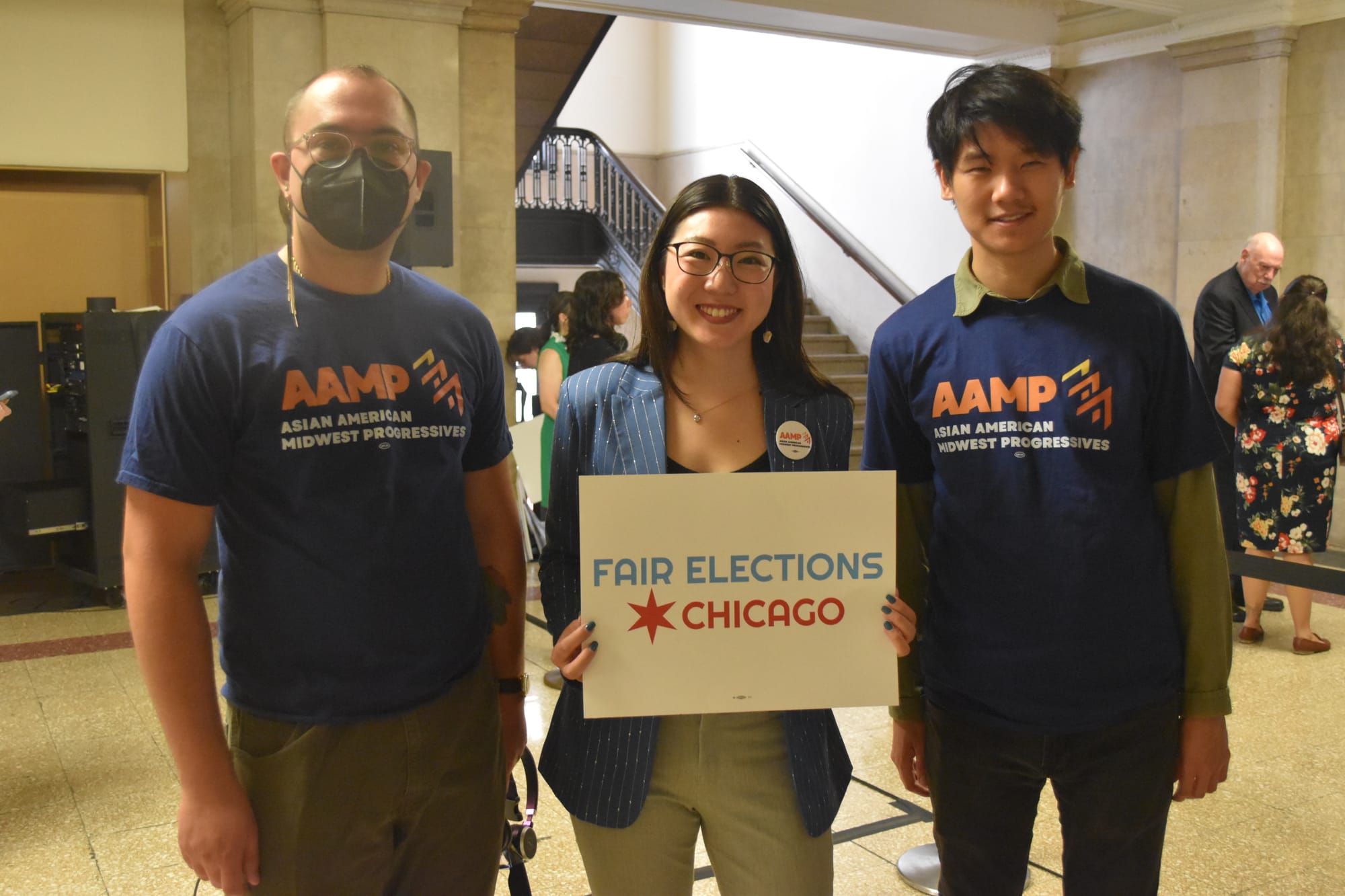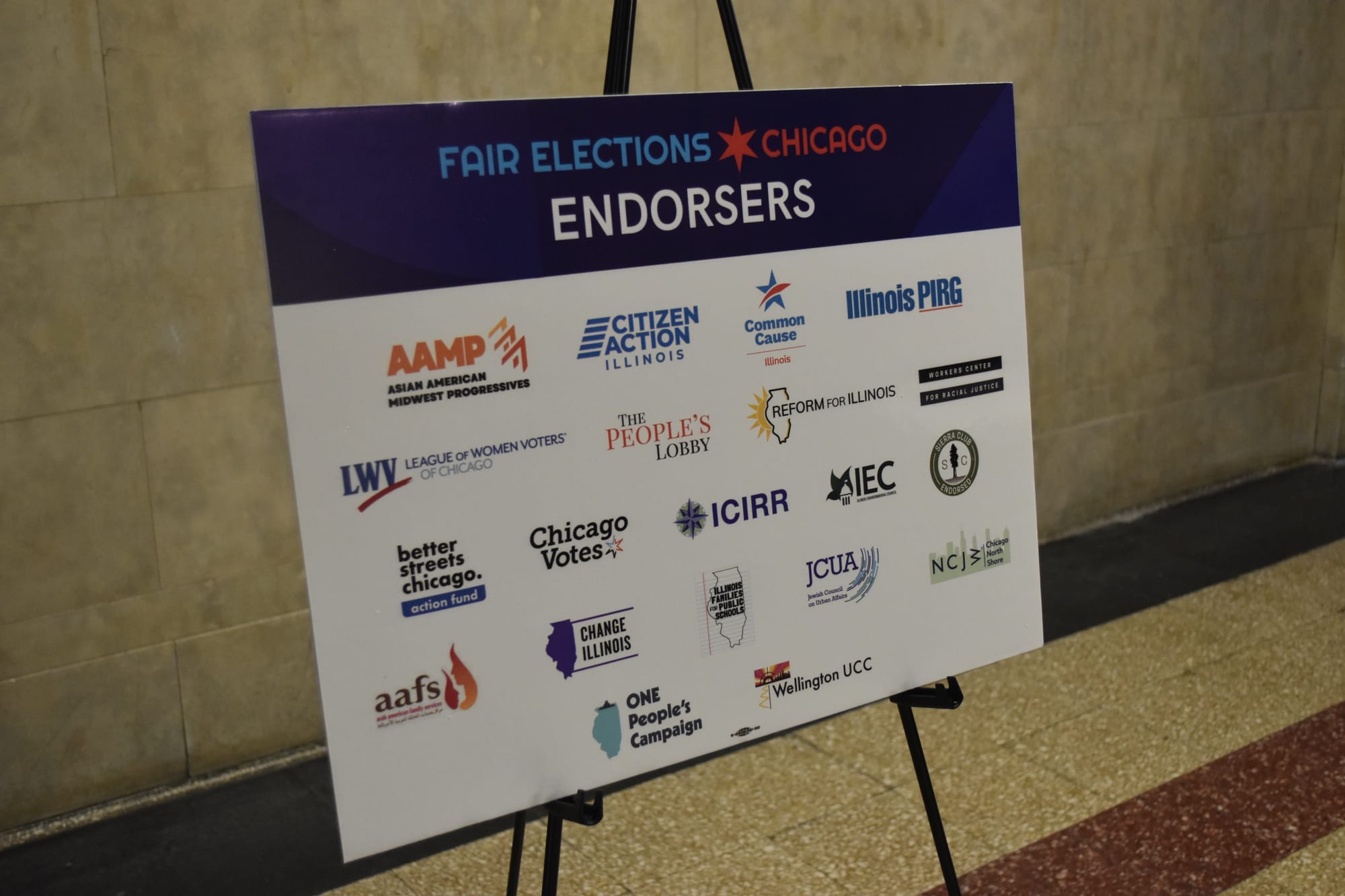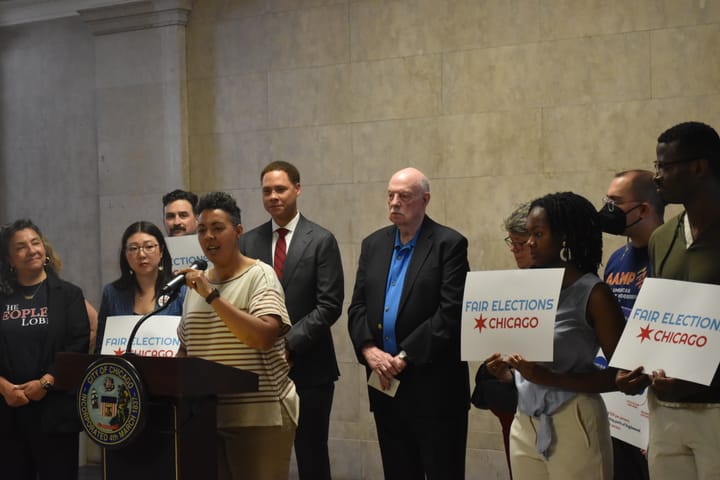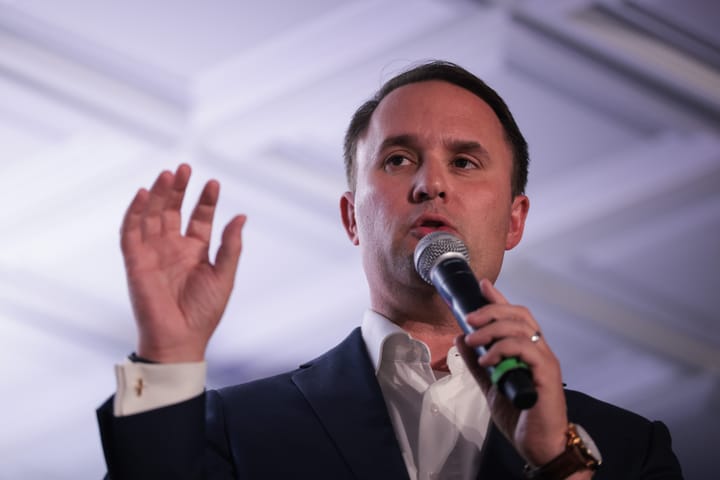It typically takes about a quarter of a million dollars to win a Chicago City Council race, a steep sum for candidates who rely on support from ordinary voters rather than deep-pocketed donors. A new measure introduced in the City Council last week aims to change that by matching small-dollar donations from everyday Chicagoans with contributions from a new public campaign financing fund.
On June 12, Alderman Matt Martin, chair of the Committee on Ethics and Government Oversight, introduced the Chicago Fair Elections ordinance. The legislation would amplify small-dollar donations to participating City Council candidates through a matching ratio, similar to public financing programs used in dozens of localities and 14 states nationwide. Martin and a coalition of community groups held a press conference at City Hall on Tuesday to announce the proposal.
Martin and the community groups say the proposal could increase participation in Chicago local elections and reduce the prevalence of the city’s “pay-to-play” politics, where special-interest donors hold disproportionate sway over lawmakers.
“A big reason why we’re championing this program is because the current campaign finance system is broken,” Martin told Sludge. “Too often, it forces candidates to rely on a few big special interest donors to fund their campaigns. Candidates and voters agree there’s a better way to do things.
“With a small investment, Chicago can join cities across the United States that encourage candidates to spend more time talking to everyday people,” Martin said. “We believe elected officials should be accountable to all of us, not just the wealthy and special interests.”
One of the organizers of the press briefing was Reform for Illinois (RFI), a good government nonprofit, which was joined by the League of Women Voters Illinois, Workers Center for Racial Justice, and other groups.
According to a forthcoming report from RFI that Sludge previewed, the average winner of City Council races last year spent $234,000, about 11 times as much as the average loser. In contests with runoff races, the winners spent even more on average—about $314,000, according to RFI’s analysis. Last year, RFI found that candidates in the five most expensive aldermanic races raised a combined $3.7 million, with one candidate, Ald. Gilbert “Gil” Villegas, bringing in almost $800,000. Several of the candidates counted corporate donors like DoorDash among their biggest givers, according to RFI.
An updated RFI analysis of Chicago’s 2023 closely-contested mayoral election, shared with Sludge, offers another stark view of how much campaign cash in the city comes from a small set of wealthy donors. Just three of the city’s 50 wards, including the wealthy areas of downtown Chicago and Lincoln Park, donated nearly twice as much as the remaining 47 combined during last year’s mayoral election, RFI found. Many neighborhoods on Chicago’s south and west sides did not include a single donor to a mayoral candidate, according to RFI’s analysis of U.S. Census blocks.

“We’ve seen these programs work for decades around the country and we know the profound benefits they can have for a city’s government and its residents,” said Alisa Kaplan, executive director of RFI, at the press briefing. “They open the doors of our democracy to people from all walks of life. They empower candidates and elected officials to represent those who otherwise would have been unheard.
“A Fair Elections program is also a powerful anti-corruption tool that can provide a much-needed boost to the public’s trust in city government,” Kaplan said. “This program would make our election funding far more transparent. It would reduce the costly pay-to-play politics Chicago has unfortunately become famous for and that can taint the efforts of the city’s many honest public servants.”
The Fair Elections ordinance, introduced by Martin, aims to provide a strong incentive for Chicagoans to give to aldermanic hopefuls. The legislation first has candidates qualify by collecting donations from at least 100 small-dollar contributors (i.e., those giving $150 or less in aggregate), with at least 60 coming from ward residents; the others may come from city residents. Campaigns that opt-in would qualify for a base payment of $50,000, a payment similar to one included in the Washington D.C. program. Contributions from city residents would then be matched by the government at a 12-to-1 ratio up to the first $25, and a 9-to-1 ratio up to the matched limit of $150. Participating candidates could receive a maximum of $150,000 from the program, which would be administered by a new Chicago Fair Elections Fund.
As with other public campaign financing systems, participating candidates would agree to abide by lower contribution limits—in the ordinance, $500 from individuals, compared with the $6,900 from an individual donor now allowed under Illinois state law. Campaigns using the matching option would also be limited to $12,000 maximum contributions from political action committees, versus the $59,900 maximum from PACs now allowed by Illinois—an amount over 37 times greater than the $1,600 contribution limit to city Council candidates in New York City that are non-participating in the public financing program. Candidates must also take part in at least two nonpartisan public debates and spend no more than $5,000 of personal funds on their bid for office, among other rules like post-election audits of campaign finances.
The proposed matching formula would allow an individual to give, in effect, a maximum of $1,925 to a Council candidate—made up by a qualifying donation of up to $150 and up to $1,425 in public funds, plus the option of $350 up to the individual limit—trimming it to about a quarter of the maximum amount an individual could contribute now. Other groups endorsing the Fair Elections ordinance include the good government group Common Cause Illinois, the progressive policy group Citizen Action Illinois, the Sierra Club, and the nonprofit advocacy group Illinois Families for Public Schools.

“People have been really excited to hear there’s a new way to finance elections,” Martin said of the response to the proposal. “People are very disheartened with a campaign finance system that’s broken, at the city level as well as federal level, and they badly want to see ways in which everyday Chicagoans have an opportunity to engage in elections—to have their voices heard, and discuss policies that impact the entire city.”
Nearly 80% of Chicago voters backed a public campaign financing option in a 2015 non-binding referendum. But a 2016 version of public campaign financing legislation, which would also have covered mayoral races and all citywide contests, was not advanced by the City Council. Chicago is the largest U.S. city that does not offer a public campaign financing system, programs used for decades in New York City, Los Angeles, and other cities.
Martin told Sludge that the coalition will be soliciting support from his 49 aldermanic colleagues, as well as the mayor’s office and other city agencies, with the goal of passing and having a public campaign financing program in place by 2027 for Council races in the next municipal elections. Martin’s ordinance was referred to the Rules Committee, where it faces further debate by Chicago alders. As introduced, the program would be an option only for City Council races, not covering the city’s high-dollar mayoral elections or elections for other offices like school board or Police District Council. The ordinance sets a funding level for the Fair Elections Fund of one-tenth of one percent of the city’s budget, powering the program estimated by Martin to cost around $9.5 million per election.
RFI’s Kaplan emphasized that making this pool of funding available could have huge benefits in good governance: “As a New York State commission said when recommending that New York adopt a similar program to battle corruption and pay-to-play politics, ‘the elimination of just one wasteful tax expenditure or one unnecessary spending program could cover the full cost of the program.’”
Since 1972, 38 Chicago alders have been convicted or pleaded guilty to crimes, according to the Chicago Tribune, the vast majority of them related to aldermanic duties. In December, former Ald. Ed Burke, the longest-serving Council member in history, was convicted on 13 counts of corruption after using his office to steer clients to his property law firm. Another former alder, Daniel Solis, became an FBI informant after pressing for campaign donations from a real estate developer in exchange for zoning changes in 2015, according to federal charges.
During Chicago’s last mayoral race, Mayor Brandon Johnson endorsed a public campaign financing program for Chicago city elections in an RFI questionnaire posed to candidates. This month, Johnson reiterated his interest in advancing such a program, telling reporters after a City Council meeting, “If the goal is to eradicate the proclivity of corruption, then let’s get at that... Let’s all work together for public financing.”
Last year in neighboring Evanston, the City Council made it the first city in Illinois to adopt a public campaign financing system, also with a small-dollar match as its centerpiece. Mayor Daniel Biss said that one of the goals of the program was to increase the diversity of candidates on city ballots by empowering runs for office by residents who don’t have a network of wealthy friends or business backers.
Once public campaign finance programs are in use, voters tend to strengthen them, and in several areas candidate participation has expanded: in 2018, New York City voters bolstered their city’s matching ratio, leading to a record high in the 2021 election in small-dollar donations, both in terms of contributions collected and public funds paid to candidates. In 2019, the Los Angeles City Council also boosted its matching rate, among other changes that strengthened the public financing system for council candidates, and the city government has been studying further programs to expand local political engagement. That same year, the San Francisco Board of Supervisors significantly amplified the small donation match for candidates for mayor and the Board of Supervisors. Public campaign financing programs in Connecticut and Seattle have seen the vast majority of candidates opt in while proving popular with voters, and in 2022 Oakland voters adopted a “democracy dollars” program, based on the Seattle model, for mayor and other city offices.
“The vast majority of Americans—across partisan and ideological lines—believe the cost of political campaigns deters good people from running for office and that it gives ultra-wealthy donors and special interests far too much influence in our democracy,” Kaplan said at the briefing. “We constantly hear from Chicagoans who are frustrated with the role of big money in our politics but think that because of the U.S. Supreme Court’s decisions, there’s nothing we can do. We are here today to tell them there is something we can do—we can adopt this Fair Elections program.”



